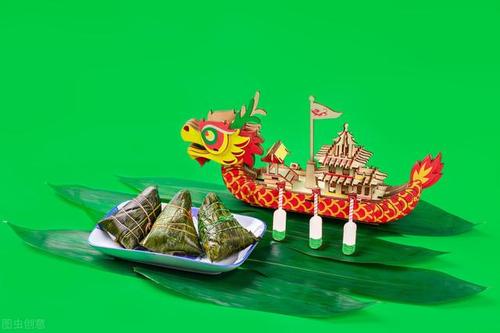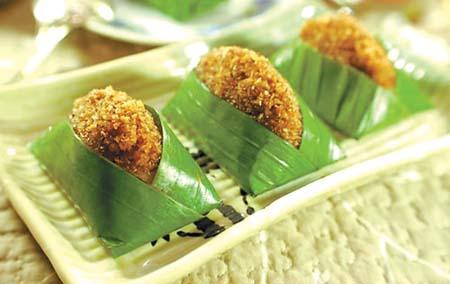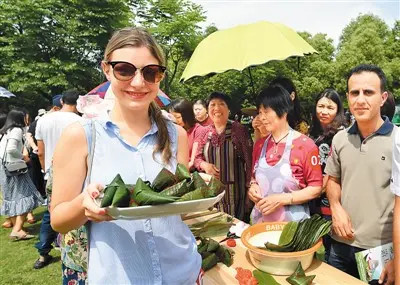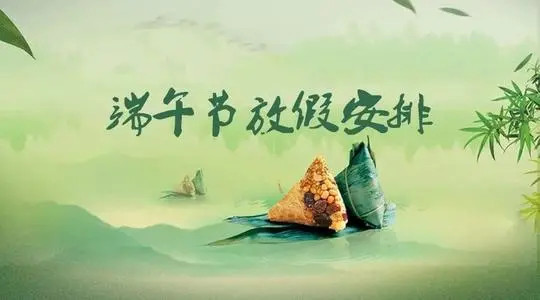The Dragon Boat Festival was originally a festival created by ancient ancestors to worship dragon ancestors and pray for blessings and evil spirits. According to legend, the poet Qu Yuan of the Chu State during the Warring States Period committed suicide by jumping on the Miluo River on May 5. Later, people also regarded the Dragon Boat Festival as a festival to commemorate Qu Yuan; there are also sayings to commemorate Wu Zixu, Cao E, and Jie Zitui.
The Dragon Boat Festival, the Spring Festival, the Ching Ming Festival, and the Mid-Autumn Festival are also known as the four major traditional festivals in China. The Dragon Boat Festival culture has a wide influence in the world, and some countries and regions in the world also have activities to celebrate the Dragon Boat Festival. In May 2006, the State Council included it in the first batch of national intangible cultural heritage lists; since 2008, it has been listed as a national legal holiday. In September 2009, UNESCO formally approved its inclusion in the “List of Representatives of Intangible Cultural Heritage of Humanity”, and the Dragon Boat Festival became China’s first festival to be selected as a World Intangible Heritage.
Traditional folk customs:
The Dragon Boat Festival, the Spring Festival, the Ching Ming Festival, and the Mid-Autumn Festival are also known as the four major traditional festivals in China. The Dragon Boat Festival culture has a wide influence in the world, and some countries and regions in the world also have activities to celebrate the Dragon Boat Festival. In May 2006, the State Council included it in the first batch of national intangible cultural heritage lists; since 2008, it has been listed as a national legal holiday. In September 2009, UNESCO formally approved its inclusion in the “List of Representatives of Intangible Cultural Heritage of Humanity”, and the Dragon Boat Festival became China’s first festival to be selected as a world intangible cultural heritage. Summer is also a season to eradicate the plague. The midsummer Dragon Boat Festival is full of sun and everything is here. It is the strongest day of herbal medicine in a year. The herbs collected on Dragon Boat Festival are the most effective and effective for curing diseases and preventing epidemics. Due to the fact that the pure yang and righteous energy of the world on the Dragon Boat Festival is the most beneficial to ward off evils and the magical properties of herbs on this day, many Dragon Boat customs inherited from ancient times have contents on warding off evils and curing diseases, such as hanging wormwood, noon water, and soaking dragon boat Water, tying five-color silk thread to ward off evil spirits, washing herbal water, fumigating atractylodes for curing diseases and preventing epidemics, etc.
Chinese culture has a long history and is broad and profound. Ancient festivals are an important carrier of traditional culture. The formation of ancient festivals contains profound cultural connotations. Ancient festivals emphasize belief in ancestor gods and sacrificial activities. The belief in ancestor gods is the core of ancient traditional festivals. Regarding the blessings of the Dragon Boat Festival, most folklorists believe that it was after the Dragon Boat Festival first that the memorials of legendary historical figures were attached to the festival, giving the festival other meanings, but these meanings are only part of the Dragon Boat Festival. Many ancient poets describe the festive atmosphere of the Dragon Boat Festival. Since ancient times, the Dragon Boat Festival has been a festive day for eating rice dumplings and grilling dragon boats. The lively dragon boat performances and joyous food banquets during the Dragon Boat Festival in ancient times are all manifestations of the festival.
The customs of the Dragon Boat Festival are rich in content. These festivals revolve around the forms of offering sacrifices to the dragon, praying for blessings, and fighting disasters, entrusting people’s desire to welcome prosperity, ward off evil spirits and eliminate disasters. The Dragon Boat Festival has many customs, various forms, rich content, lively and festive. The Dragon Boat Festival has mixed a variety of folk customs in the historical development and evolution. There are differences in custom content or details across the country due to different regions and cultures. The customs of the Dragon Boat Festival mainly include grilling a dragon boat, offering dragons, picking herbs, hanging wormwood and calamus, worshiping gods and ancestors, washing herbal water, drinking water at noon, soaking dragon boat water, eating rice dumplings, putting paper kites, watching dragon boats, tying five-color silk threads, and scenting Atractylodes, wearing sachet and so on. The activity of picking dragon boats is very popular in the coastal areas of southern China. After being spread abroad, it has been loved by people from all over the world and has formed an international competition. The custom of eating rice dumplings during the Dragon Boat Festival has prevailed throughout China since ancient times and has become one of the most influential and widely covered folk eating customs of the Chinese nation. During the Dragon Boat Festival, the performance of traditional folk activities can not only enrich the spiritual and cultural life of the masses, but also inherit and promote traditional culture. The Dragon Boat Festival culture has a wide impact in the world, and some countries and regions in the world also have activities to celebrate the Dragon Boat Festival.
Special diet:
Zong Liao: It is a traditional custom in my country to eat rice dumplings during the Dragon Boat Festival. There are many shapes and varieties of zong dumplings. Generally, there are various shapes such as regular triangles, regular tetragons, pointed triangles, squares, and rectangles. Due to the different flavors in different parts of China, there are mainly two kinds of sweet and salty.
Realgar wine: The custom of drinking realgar wine during the Dragon Boat Festival was extremely popular in the Yangtze River Basin. Liquor or rice wine brewed with realgar that has been ground into powder. Realgar can be used as an antidote and insecticide. Therefore, the ancients believed that realgar can restrain snakes, scorpions and other insects.
Five yellows: There is a custom of eating “five yellows” during the Dragon Boat Festival in Jiangsu and Zhejiang. Five yellows refer to yellow croaker, cucumber, rice eel, duck egg yolk, and realgar wine (realgar wine is toxic, and ordinary rice wine is generally used instead of realgar wine). There are other sayings that salted duck eggs can be replaced with soybeans. In the fifth month of the lunar calendar, people in the south are called the five yellow moon
Cake: The Dragon Boat Festival is a grand festival for the Korean people in Yanbian, Jilin Province. The most representative food of this day is the fragrant rice cake. Beating rice cakes is a rice cake made by placing mugwort and glutinous rice in a large wooden trough made of a single tree and beating with long-handled wood. This kind of food has ethnic characteristics and can add a festive atmosphere
Fried dumplings: In the Jinjiang area of Fujian Province, every household also eats “fried dumplings” during the Dragon Boat Festival, which is fried into a thick paste with flour, rice flour or sweet potato flour and other ingredients. According to legend, in ancient times, the southern part of Fujian was the rainy season before the Dragon Boat Festival, and the rain was continuous. The folks said that the gods had to “fill the sky” after they had penetrated the hole. The rain stopped after eating the “Fried Dumpling” on the Dragon Boat Festival, and people said that the sky was made up. This food custom comes from this。
Foreign influence
Japan
Japan has a tradition of Chinese festivals since ancient times. In Japan, the custom of Dragon Boat Festival was introduced to Japan from China after the Heian period. Since the Meiji era, all holidays have been changed to Gregorian calendar days. The Dragon Boat Festival in Japan is May 5th in the Gregorian calendar. After the custom of Dragon Boat Festival was introduced to Japan, it was absorbed and transformed into Japanese traditional culture. The Japanese do not row dragon boats on this day, but like the Chinese, they eat rice dumplings and hang calamus grass in front of the door. In 1948, the Dragon Boat Festival was officially designated as a statutory Children’s Day by the Japanese government and became one of the five major festivals in Japan. The Dragon Boat Festival has become a traditional custom, and the Japanese call it “Ai Qi recruits one hundred blessings, and Pu Jian cuts down thousands of evils.” The special food during the festival includes Japanese rice dumplings and Kashiwa crackers.
Korean Peninsula
The people of the Korean Peninsula believe that the Dragon Boat Festival is a celebration, a time to sacrifice to the heavens. Koreans refer to “Dragon Boat Festival” as “Shangri”, which means “God’s Day”. In the Korean peninsula during the agricultural society, the people participated in traditional sacrificial activities to pray for a good harvest. When the festival is held, there will be activities with local characteristics of North Korea, such as masquerade, Korean wrestling, swings, and taekwondo competitions. South Korea will worship the mountain gods on this day, washing hair with calamus water, eating wheel cakes, swinging on a swing, and wearing traditional Korean costumes, but not dragon boats or zongzi.
Singapore
Whenever the Dragon Boat Festival comes, Singapore Chinese people will never forget to eat rice dumplings and race dragon boats.
Vietnam
The Dragon Boat Festival in Vietnam is the fifth day of the fifth month of the Vietnamese calendar, also known as Zhengyang Festival. There is a custom of eating zongzi during the Dragon Boat Festival.
United States
Since the 1980s, the Dragon Boat Festival Dragon Boat Race has quietly penetrated into the exercise habits of some Americans and has become one of the fastest-growing popular sports and entertainment projects in the United States.
Germany
The dragon boat race in the Dragon Boat Festival culture has taken root in Germany for 20 years.
United Kingdom
In the UK, the influence of the All-British Chinese Dragon Boat Race has expanded year by year, and it has become the largest dragon boat race in the UK and even in Europe.
Holiday arrangements
2021. According to the notice of the General Office of the State Council on some holiday arrangements in 2021, the Dragon Boat Festival: a holiday from June 12th to 14th, a total of 3 days
Post time: Jun-11-2021




